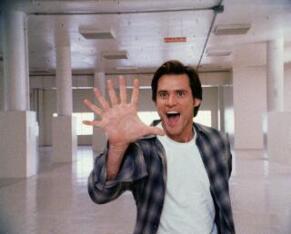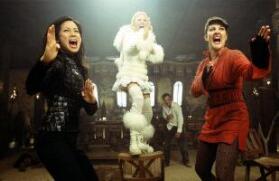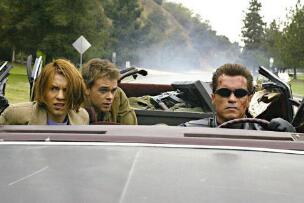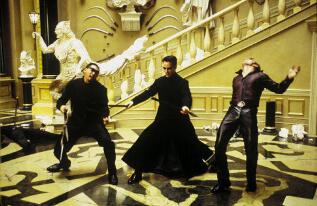Movie Reviews: Bruce Almighty, Charlie's Angels: Full Throttle, The Matrix: Reloaded, Terminator 3: Rise of the Machines
by jerry salisbury
 Bruce Almighty
Bruce Almighty
Is it considered plagiarism if you're copying yourself? If so, then Tom Shadyac is definitely a very guilty party. His Bruce Almighty is a near carbon copy of 1998's Liar, Liar, with the only difference being its protagonist. Bruce is a television reporter given the powers of God, while Fletcher was a lawyer who could not tell a lie. The layout, tone, delivery and message are all basically with the same, with the originality being the creativity of the premise. Still, the film works on its intended level. What it may lack in originality, it more than makes up for in heart, spirit and of course capturing one of Jim Carrey's schizophrenic acting. The movie really doesn't pull any surprises that Liar didn't already do, nor does it really misstep, save a slightly lengthy and overdone conclusion. The irony is not lost either in the choice of moral impossibilities given in each film. A lawyer who cannot lie, and a news reporter, who as a whole sometimes feel that they are God-like in their appearance and power that they have over society, definitely make for interesting characters and situations, and I admire the creativity of the writers in coming up with the ideas. talents. It is really impossible not to compare the two since they are so similar.
If ever a movie had a right to be "preachy" in its tone, message and delivery, it would be a movie about a common man given the powers of God. Bruce Almighty is Tom Shadyac's near carbon copy of Liar Liar just with a different twist. Instead of not being able to lie, the protagonist who has lost his faith and thinks God is picking on him, is given the power to control everything. With a small change in mood, this may have been a more powerful movie, but with several good laughs, a truly moral message and a typically captivating performance from Carrey, Bruce Almighty is just what you expect it to be. Carrey plays Bruce Gordon, a Buffalo television reporter who is passed over for a job promotion, pressured by his girlfriend and in general with where his life is going and where its been. During a bout of frustration, he lashes and smites God for picking on him. As the previews point out, this sparks a visit from the Almighty one himself, who states, to paraphrase, that if Bruce doesn't like the job that God is doing, maybe he should try to do it himself. He blesses Bruce with all of his powers with two caveats; he cannot tell anyone and he cannot control free will. What results is the fairly predictable progression of emotions, calamities and moral lessons about the abuse of power and the search for happiness, stability and contentment.
There is a definitive chasm between Jim Carrey fans in regards to which of his movies you like and what your impression is of him. There are those who enjoy the slapstick crudeness of films like Dumb and Dumber and the two Ace Ventura films. On the other side of the spectrum, there are those who enjoy his loveable, slightly flawed, but well-intended and toned down manic state such as this film, Liar, Man in the Moon and The Truman Show. Whichever side you fall on, you have to admire the fact that he can pull of both of them with a frightening ease. In the vein of Oh God, the King of Kings comes down to earth to share himself and his secrets and who better than the imposing, baritone voiced Morgan Freeman. His calm, serenely playful nature contrasts perfectly with Carrey's frustration, then confusion, then glee with which he embraces all the control of heaven and earth. These two make an unlikely but successful pairing, holding the film is held together with their performances and the original ideas of the story and lessons that it teaches.
Ultimately, Bruce Almighty is a morality lesson with a comic heart and slightly vengeful and manic twist. They say that power corrupts and absolute power corrupts absolutely but does that power truly buy happiness? There may be some executives who would disagree, but if we given all control over everything, could it really give what we truly want deep inside us? That may seem a little deep for a film with Jim Carrey, but as an actor, he can truly pull off the manic physical comedy while managing to show the vulnerability to which a lot of us can relate. To utilize a tired cliché, if it aint broke, then don't fix it. Shadyac and Carrey have found a formula that works by combining Carreys appeal with Shadyac's moralistic slice of life fairy tales to duly teach and entertain audiences, which is a welcome rarity in films these days. Bruce Almighty may not be anything spectacular, but it is definitely welcome, fun and entertaining.
 Charlie's Angels: Full Throttle
Charlie's Angels: Full Throttle
Sequels are notoriously sitting ducks for criticism from a creative standpoint, Charlie's Angels: Full Throttle does little to dissuade this. It takes more thought and effort to find things wrong with than it did to actually come up with and execute the plot. The holes are glaring, the faults are rather obvious, but still you have to look at the intent of the filmmakers and realize that it is probably exactly what they wanted it to be; a high octane, escapist testosterone fest filled with gratuitous sexuality, unrealistic actions and entendre laden humor, both visual and verbal. Anyone expecting anything more than that wandered into the wrong theater. On that level, the it succeeds, but if you read too much into it, or think too much about it, there really isn't much to the film.
Originality is not something normally sought out in summer films, but even a hint of it would have been nice here. The foundation of the plot was blatantly stolen from the second Mission Impossible movie (which I now think was intentional because of the references and not so subtle suggestions to that film). Apparently there are two rings in existence that when put together, reveal the identities and locations of everyone in the witness protection program. Why is it that secrets and such in movies like this always have some simplistic solution, or incredibly fallable weak spot? Anyhow, through an interesting link, the Angels are put on the case once the rings are stolen and organized crime families become involved in the retrieval and possession of these rings (called HALO, of course). Throw in side stories involving Bosley who has somehow changed colors, Lucy Liu's father, a rogue ex-Angel and the baffling, pointless reappearance of the Thin Man, and you basically have this kaleidoscopic story. The facts are patchwork and scattershot, often losing focus amidst the convolution of side stories and double entendres, certain aspects are unnecessarily given too much relevance while others are skipped over after teasing with potential. It may seem unfair to criticize these things, but then are as blatant and omnipresent as this, it's hard to ignore them. The nature of the first film is there, but the cohesive nature and flow was lost amidst the attempt to show how smart and hip the writers can be. There are just enough quips, action sequences and male catered fantasy action scenes though to keep this from being a complete waste of time though.
Also saving things a bit is the casting of Bernie Mac as Bosley (apparently the original Bosley was adopted into an African American family) who gives a comic adrenaline shot and plays perfectly off the Angels.
"Y'all are fine, but you're crazy"
I still agree that they probably could not have cast the three Angels any better. They are beautiful, athletic, have sense of humor but most of all, establish their own identities which is a necessary aspect for this film to have any chance of working. Moore falters in her villainess role, only because she's done it before, and done it better. It doesn't even seem like she is really trying here, which is sad because her role is a juicy and vital one and could have made things so much better if she had put her bitchy heart into it. Finally, the cameos are once again a pleasant respite when the plot becomes too much. Mary-Kate and Ashley as replacement Angels, a nearly unrecognizable and unspectacular (some would say intentionally understated) Bruce Willis, as well as classic Angel Jaclyn Smith show that someone was focused at some point on parts of the story ideas from the first film that worked. I just wish that they had gotten the ADD under control more before submitting this for perusal.
Ultimately, Full Throttle is a very loud, very fast; campy ride through sequel land that may leave your brain empty of purpose, but will definitely never bore. The nature of sequels has always boiled down to intention versus execution. The original was fun, full of life, camp and humor that executed just the right balance of each to work. With this sequel, the intention should have then been to expand on that fun by adding more cultural references with a simple, relevant plot and carry on the spirit of the first film. Unfortunately, by trying to add too many ideas in (another crowded writers meeting I'm sure where someone was afraid to say no, so they just included everything) they have complicated things to the point of confusion and lost some of the steam from the first film. Full Throttle is enjoyable eye candy, but doesn't quite leave as sweet of a taste.
Matrix: Reloaded had a lot of room to fail. It was a big budget sequel to a wildly popular film, which tested and exceeded the boundaries of cinematic mental stimulation, cerebral temptation and visual amazement. The field was ripe for a fall from grace for the legions of fans, but the Wachowski brothers do not disappoint. The second installment of this 3 part series (with the third part coming this November for those frustrated by the obligatory ..to be continued at the end of this film) is just as much a sensory overload as the first film with stunning albeit not as original effects, a mentally challenging storyline and a satisfying fulfillment to those who waited anxiously for 4 years for this film. It is difficult to tell how long after the first movie that Reloaded takes place, but that is actually a moot point in the grand scheme of the plot. The entire crew is back, Neo, Trinity, Morpheus and even the ominous Agent Smith who has now found a way to replicate himself infinitely. The last remaining human city of Zion, which appears to be taken straight out of the Mad Max movies, is threatened by The Machines. These are the entities that were harvesting the humans for energy in the first film (remember the disturbing images of the embryo farms from the first film. The Machines are tunneling towards Zion and their numbers match that of Zion's population. It is up to Neo and company to stop this from happening however possible.
We are lead through this storyline via a complex set of circumstances and events that I will not reveal because 1) I don't believe in doing that and 2) I'm not wholly sure myself. This is a movie that will probably require multiple viewings in order to discern exactly what is going on and even then, I'm not sure you really ever will completely. In the first film, multiple viewings created further revelations and discoveries into its complex nature. This time around, we are given so much information, namely a labyrinthine speech from the creator of the Matrix that contains recognizable words, but when strung together in the prose and context of his delivery is difficult, at best, to dissect and understand. I am waiting for the online Matrix fanatics to do this for me, because it makes my head hurt to do so. Now some were chastising me for saying that this film was not as good as the first one, which it really isn't. But it is close. The film missteps slightly in its focus on the Neo/Trinity love story, which they build on from the first films finale, its Byzantine storyline which is a bit frustrating and its introduction of the definition of each entity in the Matrix as either a program, a hacker, a virus, a programmer or just a person. These things cloud and confuse things a bit, however, the setup is there for one fantastic finale in November.
I would be remiss in my analysis of this film without mentioning the special effects and fight scenes in the film. The original film set the new standard for visual amazement and technology. The 360-degree stop action suspension scenes, the slow motion step-by-step movements and the elaborate fight scenes spawned many films to copy the techniques and tricks, but Matrix will always be the originator. This time around we are given an astonishing, but not original car chase through the pseudo streets of Los Angeles and a fight scene involving swords and spiral staircases that is breathtaking to behold. But for me, the most memorable scene in the film is the initial fight scene between the now seemingly invincible Neo and a never-ending army of Agent Smith clones in an inner city playground. This sequence combines the choreography, the various angles, the stop action surround camera shots, an interesting use of a tetherball poll and the coolest back/front flip that you may ever see. The Wachowski brothers may not have raised the bar in innovations as the first film did, but they certainly maintain their visual mastery.
They also keep things fresh with the addition several new and interesting characters to go with the recognizable faces. It is sad to think that this will be the last appearance of the Oracle (due to the death of Gloria Foster), but I think we may see her bodyguard back again. Also impressive and hauntingly creative is the presence of the ghostly albino henchmen known as The Twins, who are the henchmen of the kidnapper of another new character, the multi useful Keymaker. These twins seem as invincible as Neo and creative in their survival skills. All of the new characters show the series expanding while maintaining the intelligent consistency of the series.
Reloaded takes the same path as the quintessential second film in a series, The Empire Strikes Back. It picks up the story from the first one, jumping right into the action and building on the story rather than carbon copying just to make a few dollars. This is one of the many aspects that make Reloaded one of the most memorable films of the year, and a worthy follow-up to a groundbreaking film.
Ultimately, Matrix: Reloaded succeeds where other sequels have failed; by keeping the spirit of the first film while inserting an original story into the mix. Many have noted the Biblical and spiritual references, which run rampant through the film. This series is easily a more thought provoking equivalent to the Star Wars series of the late 70s and early 80s. Films that challenge us mentally while amazing us visually are few and far between, Requiem for a Dream and Dark City stand out as examples. But with Reloaded, the Wachowski brothers have created a challenging, daunting film that stumbles slightly with the love story, and confuses definitely with a few of the speeches and story tangents. It definitely piques the curiosity for the third installment as any good middle film should do (see Empire Strikes Back) and makes sure that your brain is in full gear and you are strapped in for this experience for this one, you wont be disappointed.
 Terminator 3: Rise of The Machines
Terminator 3: Rise of The Machines
The Terminator films have always flown in the face of conventional sequel-making to the point where it has and will become the standard that no others ever surpass. Terminator 3: Rise of The Machines carries on that legacy with an explosively loud and proud bravado. Rarely if ever is it that as the numbers go up, the movies get better, even Lethal Weapon, Raiders of the Lost Ark and Star Wars have had their stumbles despite follow-ups that surpassed the originator. In Rise of the Machines, Jonathan Mostow has ably stepped into the very large and intimidating shoes of James Cameron and thanks to his creative visions, loyalty to the appeal of the first films and the gift of a solid screenplay, has carried the torch proudly on towards what will no doubt be another chapter of this series.
To understand the story and its consistency with the previous films, it may benefit people to actually watch the first two films prior to viewing this one. Since there has been such a distance between the films (8 years from 1 to 2, 11 years this time around) the facts may be rusty, but you really aren't penalized by not remembering, since the story is fairly simple and only the details require some remembrance. John Connor is the target of terminators from the future, because he is the leader of the resistance in a post-apocalyptic world. We learn more about how machines and computers actually took over the world and targeted humans, and this may actually lend some effectiveness to the previous films. There was a computer program called SkyNet, which was the controlling entity in the attempted destruction of the human race. Through its progression and to this point, the story actually becomes a not so subtle commentary on the human dependency on computers, call it a cyber Frankenstein syndrome to the point of what we create to help may end up being our downfall. We meet its creator and see the groundwork for how this actually occurred, which is believable and shows that the time between films was actually utilized to put some thought into a solid cohesive story. Connor, now in his early 20s, once again must go on the run from an even newer upgrade of machine, call her the Terminatrix, as she cannot seemingly be destroyed and has the ability to regenerate and even control lesser models. Another model of the T-1000 (Arnold) is back to protect John, and we also learn why this occurs and the fateful and fate occurrences of how John actually becomes the leader, since he has basically become a rebellious, angry loaner now. The new characters add support to the story instead of distractions, as is usually the case.
The element of humor, the fish out of water adaptations and robotic mindset and reactions, have always been a source of smirks and smiles throughout the series, but this time around, Mostow has built them intentionally into the story giving even more depth and flavor to things. Who amongst us have not wondered about Arnold's naked first appearances, well Mostow uses this to its fullest in a scene that you have to see to truly appreciate. This is reflective of the energy and fun that resonates throughout every aspect of T3.
People raved about the car chase scene in the Matrix: Reloaded as being breathtaking and spectacular, but I task those people to not be awestruck and ashamed after seeing two sequences in this film; the opening chase involving a crane, remote controlled police cars and a veterinary ambulance, and a later one involving a hearse, semis and our favorite little female destructor. Once the story goes through its expected, obligatory yet necessary set up, these kick things up a notch and never really let go.
Sometimes in sequels, having multiple actors portraying the same character through a series can be a kiss of death, but similar to the case of Tom Clancy's Jack Ryan, the changing of John Connor is a smooth and successful one. Another facet that shows that the writers put thought into the consistency and flow of all 3 movies is the fact that despite that fact Edward Furlong (from T2) is old enough and would be believable in reprising the role, Stahl with his rugged baby face and eyes, more closely resembles his movie father (Michael Biehn from T1). Also, will someone please give me whatever elixir, diet and regimen that Arnie is using, because he is the only constant through all 3 films (spanning 19 years) and he barely even shows it. Physically, mentally, every aspect of his characters portrayal is dead-on, with more humor thrown in this time almost in self-parody from the previous films, but also with the action scenes, keeping up with his younger costars, some of which were in diapers when he first baritoned that he would be back.
Ultimately, Terminator 3: Rise of The Machines is the antithesis and respite from what sequels should be and usually are. Follow-up films should add to the original stories while not suffering from amnesia in regards to previous events and characters. T3 shows thought, energy, more humor than the previous films and a performance and appearance of Arnie that should have every man wanting his secret on how to look like he does into his 50s. This may not only be one of the best films of this year, effects, story, intelligence, action and humor, but it may be the echelon that other sequels should aspire to be when they grow up.
Copyright (c) 2005 erasing clouds |
|
 Matrix: Reloaded
Matrix: Reloaded